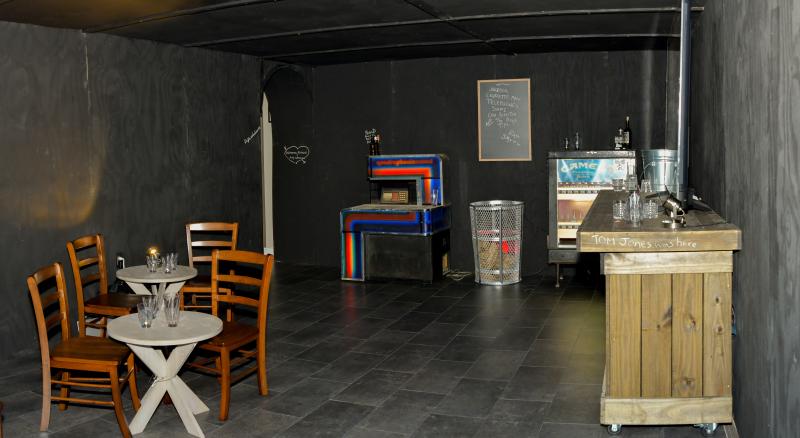Grant Spotlight: Stonewall Library and Archives

Recreation of the Stonewall Inn from the morning of June 28, 1969, which is part of the Stonewall Library and Archives' Stonewall "Inn" Stonewall exhibit. Photo by Robert Kesten
The Stonewall Library and Archives, which today houses more than 28,000 volumes and 2,700 linear feet, or 6 million pages, of LGBTQ (Lesbian, Gay, Bisexual, Transgender, and Queer) history, started from humble beginnings: in 1973, Mark Neil Silber, then a 17 year old in Hollywood, Florida, established the Stonewall Library using books and publications he had collected, naming the repository after the Stonewall Inn riots of 1969.
Eventually, Silber and a fellow student at Florida Atlantic University combined their materials to form the library and archive, establishing a governing body and housing the collection at the Metropolitan Community Church of Fort Lauderdale. When it outgrew that space, the collection moved to a permanent home in Fort Lauderdale, where it now serves as one of the leading archives in the country dedicated to LGBTQ culture and history.
This year, the Stonewall Library and Archives received a $10,000 National Endowment for the Arts Challenge America grant to support exhibitions and events focused on women, BIPOC (Black, Indigenous, and People of Color) communities, and transgender individuals.
Robert Kesten, executive director of the library, said this project is part of an ongoing effort to create parity within Stonewall’s collections.
“Over the last two years, we have increased our collection of women-donated material,” he said. “We've increased dramatically the number of books submitted and donated by publishers and individuals about women, by women, for women. That has led to one of our exhibits being curated by trans women of color, their materials, their voice, their things on display.”
The library now has a dedicated space for exhibits curated by people who have traditionally been marginalized within the LGBTQ community.
One of these exhibits was State of LGBTQ+ Healthcare Experiences, curated by a Black lesbian healthcare executive who used the space to highlight health disparities in the community and identify opportunities for providing better and more comprehensive care for all.
“That opens the door to better healthcare, and better healthcare leads to a healthier and more vibrant community,” Kesten said.
The library has also recently welcomed its first Asian artist to exhibit in their space. For Adam Chau’s Generated Love series, he used AI technology to create ceramics that mirror traditional blue-and-white China designs with images of gay Asian men.
“It's been really an exceptional opportunity for us to tell the stories of other people by allowing them to tell their own stories,” Kesten said of the exhibition space. “It also demarginalizes people by letting them tell those stories so we can see where the similarities are, which are far greater than the differences.”
Kesten added that context is vital to helping people understand the present, and one of the library’s missions is to provide this context to people within and outside of the LGBTQ community.
“I think that that's exactly why we're here, to put things in context, to take that fear away, to provide information, to show where we fit in and how we fit in with other people,” he said.
“When you're informed, when you understand there's a reason we get to where we get to, change becomes much less scary,” Kesten said. “When change becomes less scary, you're able to grab it with both hands and move forward because then you have an opportunity to influence that change or to learn how to roll with the change, and you're not always the target of the change.”
A new exhibit at the library, Stonewall “INN” Stonewall, is bringing some of that historical context to life. For this project, visitors to the library will be able to experience a recreation of what the Stonewall Inn in New York City looked like in the early hours of June 28, 1969, prior to the police raid and fire that closed the building and launched the gay rights movement.
The exhibit will also include other materials, providing insights into that historic moment and the events that followed. Once the exhibit closes at the library in September, it will travel for the next 10 years, leading up to the 65th anniversary of the Stonewall riots.
“Knowing where you came from and knowing where you are and where you're going are all tied together,” Kesten said.
For those outside of the Fort Lauderdale area, much of the library’s materials are digitized and available online. Items are searchable by location or medium, including press releases, fliers, serial publications, newsletters, and conference papers. The library also has a series of oral histories in its digital archive, including one from a bartender at the Stonewall Inn who was present the night of the riot.
“This is a place where the community can share and pass along their personal collections,” Kesten said of the library and archive. “We have a firm belief that every story is part of the historic record, that when you leave any one story out intentionally or unintentionally, you're really changing the course of history because it's very often the underpinnings that truly give history its context.”
Kesten said having a space that is curated by and for the LGBTQ community is essential because of historic bias and exclusion, but he also emphasized that these materials, the exhibitions, and programs are meant to be shared with all.
“This is a community that is in every other community,” Kesten said. “There's not a race, a nationality, an ethnicity, a job, a religion where members of the LGBTQ community can't be found.”
“From our perspective, that means that we have an obligation to welcome everybody under that rainbow flag, that it is not a rainbow for us. It is a rainbow for us to bring people together. That means we are just one family.”




